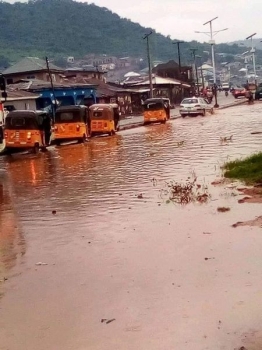Eneojoherbert
Others : Iam A Journalist, Marketing Specialist And A Brand Promoter
Wants to meet Work Partners : Media Persons, Journalists
Articles
50
Followers
7
profile/9885234816581830720190327_081824.jpg
Eneojoherbert

PROACTIVE MITIGATION PLANNING AS SOLUTION TO FLOODING
~5.0 mins read
By Mathew Ochada
Floods lead to tremendous losses of
property, infrastructure, business and increased risk of diseases. Floods are
also the most frequent natural disasters, affecting over 2.8 billion people in
the world and causing over 200,000 deaths over the past three decades.
Floods are naturally caused by rise in
temperature resulting in heavy downpours of rain, glacier melt and thermal
expansion of the ocean, subsequently causing a rise in sea levels and
inundation of coastal lands.
In Nigeria, though not leading in terms of
claiming lives, flood affects and displaces more people than any other
disaster; it also causes more damage to properties. Flood disaster has been
perilous to people, communities and institutions. It has shattered both the
built-environment and undeveloped plan. It has claimed many lives, and millions
of properties got lost due to its occurrences.
One prominent feature about flooding is
that it does not discriminate, but
marginalized whosoever refuses to prepare for its reoccurrence. From
experience, flood also exposes residents to an impending cholera, diarrhea,
malaria, skin infections and other water-borne diseases epidemic.
Kogi state the 'Confluence of
Opportunities' is currently going through a sad moment occasioned by massive
flooding. At the moment, nine out of twenty one local governments in Kogi state
are seriously battling with uncomfortable situations caused by the flood.
It was reported that another round of flood
disaster is gradually creeping into Lokoja, the state capital as the water
levels have risen to 40 metres and already flowing into some homes.
The palpable fear is in line with the fact
that the rise in water level, this time around, has coincided with the same
period in 2012, when water level rose to an extent that the flood disaster that
caused untold hardship and loss of property worth billions of naira for
residents in the state.
So far, the local governments in Kogi state
affected are; Bassa, Lokoja, Kogi, Omala, Idah, Ibaji, Dekina, Ofu and
Igalamela-Odolu. At a recent stakeholders meeting organised by the National
Emergency Management Agency (NEMA) in partnership with the Kogi State Emergency
Management Agency (KOSEMA), it was revealed that floods from River Niger have
submerged over 70 communities and displaced over 50,000 people displaced from
their houses in different parts of the state.
Sadly, Ibaji local government area is the
worst hit by the flood. Thousands of residents have been sacked from their
houses in the area and all the 26 schools in the council have been converted to
internally displaced persons (IDP) camps.
Also, residents of about twenty one
communities in Lokoja local government area have relocated to neighbouring
Niger state. These communities include; Eggan, Twaki, Kinami, Lagan, Buzhi,
Ebwa, Miza, Ebbe, Dambo, Twanawa, Taraba, Taji, Doji, Compala, Edo, Lanbata,
Budon, Gori, Budon Tsofo, Ashe and Arra.
Kogi state, most especially Lokoja city,
are susceptible to flooding and this is because of building of houses on flood
plains, inadequate drainage of storm water, lack of maintenance of existing
drainage systems, increased run-off because of uncontrolled expansions of
impermeable surfaces and weak institutional capacity.
No doubt, the continuous ravaging flood has
put many Kogites into untold hardship which those in the coastal communities
are grossly affected while the relief materials are not seen to be provided by
the concern authorities.
Since the upsurge of the flood challenge,
economic activities have been totally grounded without immediate solutions to
it. Even some of the highland communities are gradually taken by the flood.
Flood, a natural disaster, cannot be
entirely avoided; however, the losses and damages occurring due to flood and
other weather-related events can be prevented by proper flood mitigation
planning.
Flood Risk Management (FRM) is the best way
to go. FRM comprises measures aimed at reducing the likelihood and impact of
floods. It encompasses the prediction of flood hazards, socio-economic factors
and consequences, and measures/tools for risk reduction.
It is not a static approach but adapts to
changing circumstances. The adoption of a particular flood risk management
strategy is influenced by numerous factors from environmental (geographical
features of an area and the type of flood risk an area is prone to) to
socio-economic factors and can include both structural and non-structural
measures.
Historically, Nigeria has been more focused
on post-disaster flood response than control. Reducing and addressing exposure
to flood risk is now a national priority in the Nigerian government’s disaster
risk management agenda. A national framework, now in place, aims at moving reactive
flood response and recovery to pro-active risk management, however, nothing
concrete has been done and a national FRM strategy to ensure harmonization of
practice is still not in place.
This is not encouraging despite the
comprehensive post-disaster needs assessment conducted in 2012 by the federal
government with international collaboration. This raises questions on the
political will to achieve this goal.
Funds are readily released post-floods but
not pre-floods to avert it. Inadequate attention has been paid to flood control
and management on a nationwide level and efforts aimed at addressing the
challenge have lacked proper coordination and therefore, failed. Despite
evidence of flood interventions in the past, the lack of an integrated FRM practice
means that sub-optimal solutions are adopted and in numerous cases, more
problems are created in the process.
As such, it’s necessary to have a proper
estimation of flood extent for the different flow conditions so that proper
flood evacuation and disaster management plan can be prepared in advance.
Careful examination and research from flood
areas clearly indicate that heavy rainfall, blocked and/or failure of drainage
systems, and lack of land use planning are considered the most frequent reasons
for flooding.
Furthermore, investigations into the
disaster revealed the adverse implications of flood on local community
lifestyle and social relationships, namely property damage, loss of lives,
community displacement and mental health issues.
A United Nations report on the
International Strategy for Disaster Reduction, suggests that to reduce the
effects of these floods, it is crucial that a sound flood management policy is
formulated. One which is driven by knowledge of the frequency and magnitude of
impacts of these floods.
More than ever, plans and efforts must be
undertaken to break the current event-disaster cycle, even as there is the need
for decision makers to adopt holistic approaches for flood disaster management,
the report concluded.
On a global scale, the number of people
affected, alongside economic damages resulting from flooding are rising at an
alarming rate, and society must shift from the current paradigm of
post-disaster response to proactive mitigation planning.
Conclusively, Kogi State needs a
contingency plan in the form of four phases of managing disaster – prevention;
preparedness; response; and recovery – that can cater for a very high
population. More focus should be placed on the disaster preparedness of the
urban poor communities. Market men and women, schoolchildren, the illiterate
and literate alike should be continually trained on flood disaster risks to
build their little awareness.
The government should accord free medical
care to flood victims, especially psychological care for post-traumatic
incidences.
Flood control strategies should be
regularly updated by the government. There should also be regular inspection on
adherence to land policies by the Ministry of Lands and Environment, which will
put land owners in check on encroachment into wetlands and other restricted
areas.
Advertisement

Link socials
Matches
Loading...
